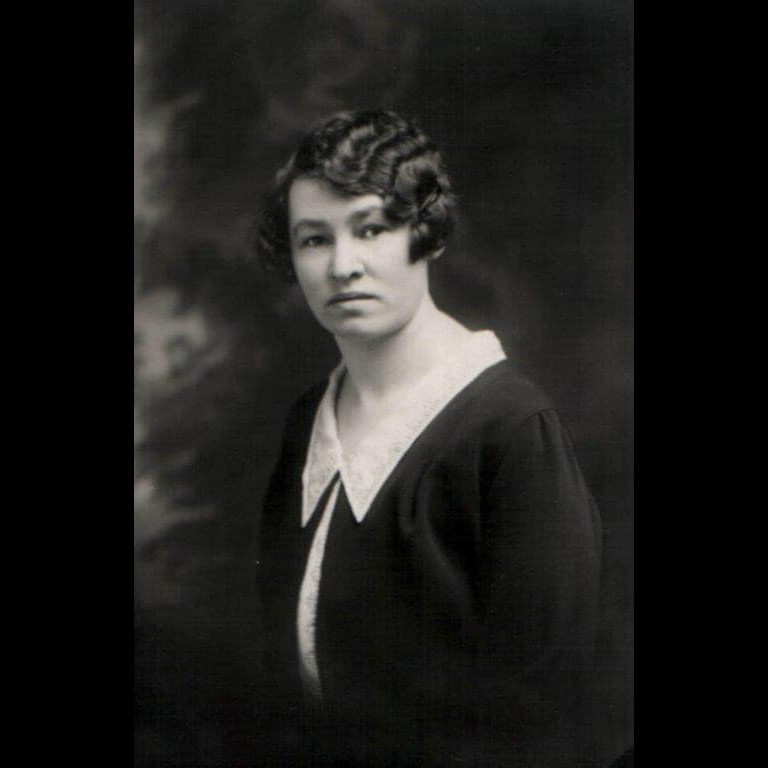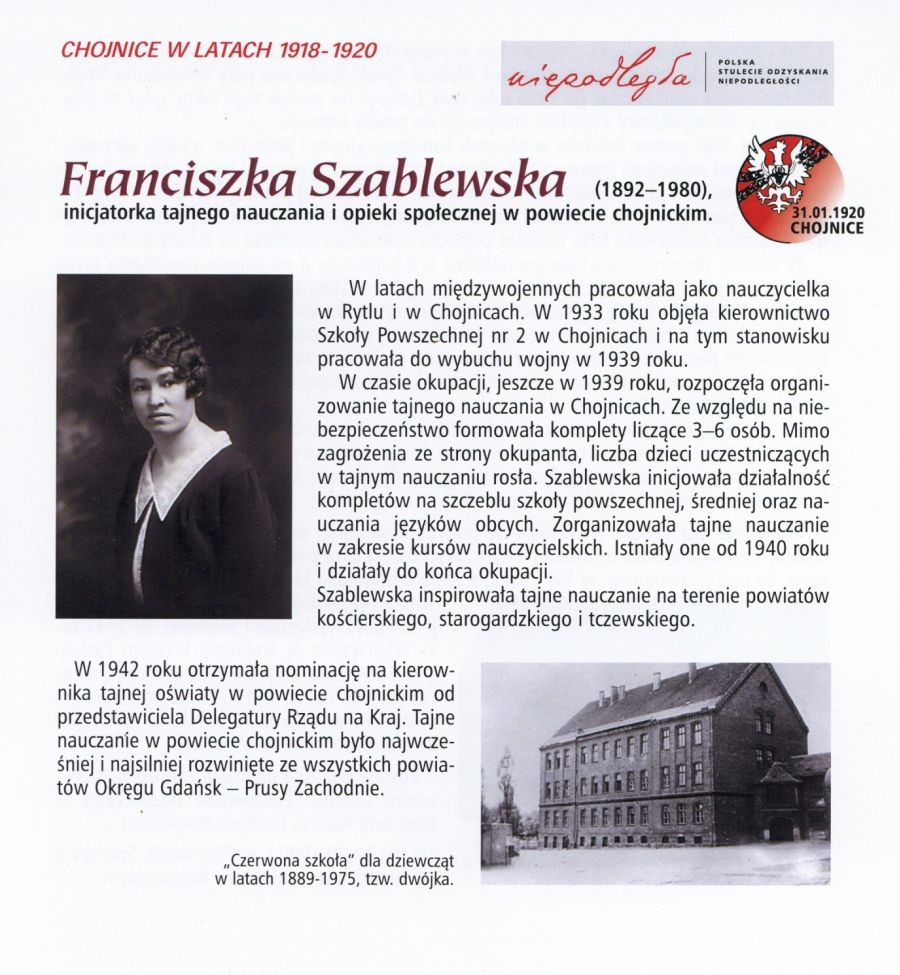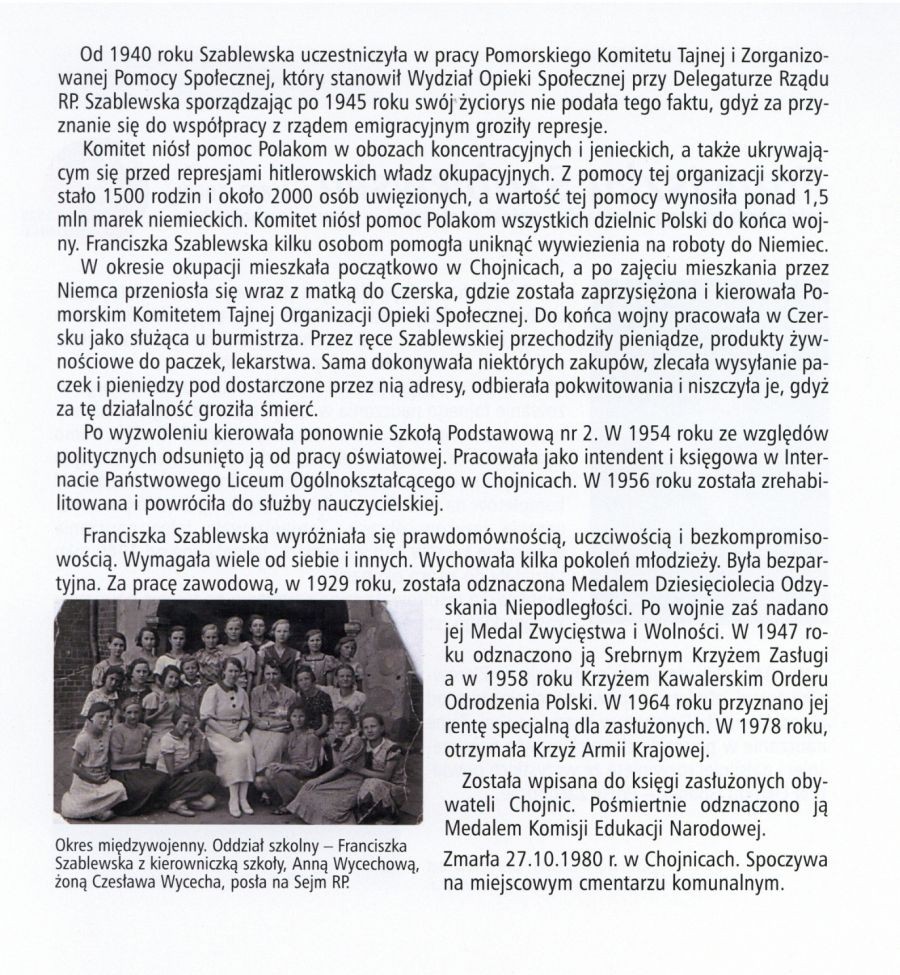
Franciszka Szablewska (1892-1980), teacher, school headmistress, organiser of secret education and social care during the occupation years
Franciszka Szablewska's life and social activities make it possible to count her among the outstanding Chojnice women of the previous century. In particular, she deserves to be remembered for her heroic activity during the Nazi occupation, organising - often at the risk of her life - secret teaching and care for the needy.
Franciszka Szablewska was born on 3 May 1892 in Łęg near Czersk. She was the daughter of Franciszek and Elżbieta née Ufnowska, a farmer. Despite the fact that her youth coincided with a period of intense Germanisation, she was brought up in a patriotic atmosphere. At the turn of the 19th century, the Polish-Catholic ‘Oświata’ (‘Education’) Society was active in Łęg, with Father Augustyn Worzałła, a distinguished national activist, as its spiritual leader. After completing her education in Łęg, Franciszka attended the private school of Director Słomińska in Poznań. After her father's death, the family's financial situation deteriorated considerably, and for this reason Franciszka was unable to continue her education. She then expanded her knowledge through self-education. After an apprenticeship in housekeeping, she took up housekeeping at the Taczanowo estate in Wielkopolska.
When Pomerania was returned to a reborn Poland in 1920, there was a shortage of teachers, which prompted Franciszka Szablewska to devote herself to teaching. She trained in Toruń, gaining qualifications in various subjects. In 1934 she passed the exam authorising her to manage an educational institution. From 1920 she worked at a school in Rytel, and from 1922 in Chojnice - as a teacher at Primary School No. 2, and from 1938 as the head of Primary School No. 3. Her co-workers remembered Szablewska as a person of a gentle disposition and great forbearance.
The most active time of Franciszka Szablewska's social activity was during the tragic years of the Nazi occupation. As early as 1939, she organised a meeting of female teachers to start teaching children in secret classes. In the first school year, 9 teachers taught 46 children, and in the following years, despite the threats, the number of both teachers and pupils increased. There were 4 centres of clandestine education in the Chojnice district: in Chojnice and in Czersk, which Szablewska directed personally, as well as in Brusy and Karsin. In addition, on her initiative, 9 teachers she knew conducted classes in the districts of Koscierzyna, Starogard and Tczew. Thanks to Szablewska's efforts, secondary education could also function in Chojnice. Despite the problem of a shortage of textbooks and school books, the educational process continued thanks to the kindness of teachers and students, who lent them to each other. This involved a huge risk, because at that time the most severe punishment for possessing Polish books, yearbooks and magazines was a concentration camp. Franciszka Szablewska, as well as her colleagues and pupils, showed great courage and maturity every day.
In August 1942, Szablewska was appointed head of secret education in the district. Her secret education initiative up to that point had been completely independent. According to historians' assessments, teaching in the Chojnice district was the best developed in the entire Gdansk-West Prussia district.
Franciszka Szablewska's second field of activity during the occupation was helping people in need. In 1940, the Pomeranian Committee for Secret and Organised Social Care was established. Its aim was to help the families of those murdered by the occupying forces and deported to concentration camps, as well as prisoners of war in oflags and prisoners in camps. It coordinated all the activities of this organisation and was assisted by more than 50 activists from Chojnice, Czersk and other towns in the area. The help given by the Committee saved the lives of many and helped them to survive the difficult war years. The Pomeranian Committee for Secret and Organised Social Care operated within the structure of the Social Welfare Department at the Government Delegation of the Republic of Poland, and Szablewska was sworn in by representatives of the department. After the end of the Second World War, she could not give these facts because she would have exposed herself to harassment and repression.
Szablewska lived in Chojnice during the occupation, and when she was removed from her flat, she moved with her mother to Czersk. Among other things, she worked as a domestic helper for the German mayor Otto Reuter, which to some extent dampened the Gestapo's vigilance against her underground activities.
In 1945, Franciszka Szablewska once again took over the management of the Primary School No. 2 in Chojnice. She carried out her duties with dedication and kindness towards the young people and staff. As a deeply religious person, she set the moral bar high for herself and demanded the same from others. In 1954, for political and ideological reasons, she was dismissed from her position and barred from teaching. She then took up a job as head of the business department at the boarding school in Chojnice. Two years later she was reinstated in her profession by the Provincial Rehabilitation Commission for Teachers. She then taught part-time at SP No. 1 and 2 in Chojnice, and finally retired in 1964. Her work was recognised as she was awarded a special pension for meritorious service by a decision of the ZUS Supervisory Board. She died on 27 October 1980 and was buried in the municipal cemetery.
Franciszka Szablewska did not found a family of her own. She devoted her entire life to working for other people, especially her pupils, to whom she passed on her love of the fatherland by her own example. She was decorated with, among others, the Decade of Regained Independence Medal (1929), the Victory and Freedom Medal (1946), the Silver Cross of Merit, and in 1958 with the Knight's Cross of the Order of Polonia Restituta. In April 1980, she was entered in the honorary book of Distinguished Citizens of Chojnice. Posthumously, in 1981, she was awarded the Medal of the Commission of National Education, and 10 years later the City Council named one of the streets after her. As a teacher and organiser of education, she deserved a permanent place in the history of the city and the region.
More information about Franciszka Szablewska can be found in the following publications: ‘Bazuny’ No. 8 (1983), “Pomerania” No. 1 (1974), “Patrons of Chojnice streets” by Kazimierz Ostrowski (2000), as well as in ’Poczcie zasłużonych Chojniczan. A biographical dictionary of the 20th century’ by Kazimierz Ostrowski (2020).

